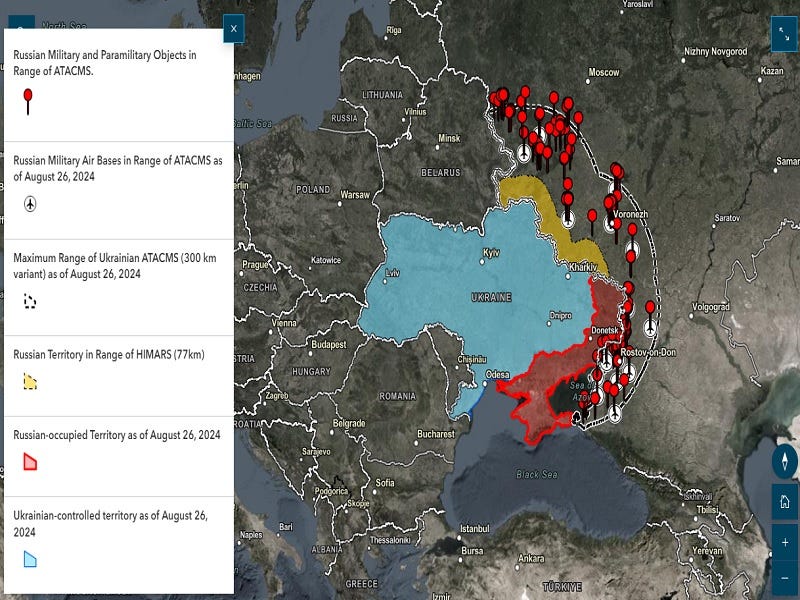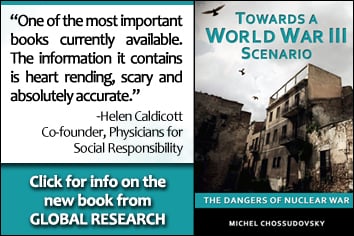
Reports emerged on Sunday that the US finally approved Ukraine’s request to use long-range ATACMS missiles against targets inside of Russia’s pre-2014 borders, which was followed by other reports claiming that France and the UK then followed suit. They’ve yet to be used at the time of writing, but Zelensky ominously implied later that day that this could happen very soon. The reason why this is the moment of truth is because Putin earlier warned that it would amount to NATO’s direct involvement in the conflict.
This analysis here about Russia’s updated nuclear doctrine hyperlinks to eight related analyses about everything from “red lines” to the “war of attrition” that readers should review for background context. It also points out how this new policy “regard[s] an aggression against Russia from any non-nuclear state but involving or supported by any nuclear state as their joint attack against the Russian Federation” in Putin’s own words. The stakes therefore haven’t ever been this high.
The reason why the US only just now greenlit Ukraine’s request is because the outgoing ruling collective wants to create the conditions for ensuring that Trump either perpetuates or escalates the conflict. There was concern after his historic electoral victory that he’d completely cut Ukraine off of aid and thus hand Russia its desired maximum victory that would then lead to the US’ worst-ever strategic defeat. It was explained here, here, and here, however, that he was always more likely to “escalate to de-escalate”.
.

.
In any case, what’s most important is how perceptions of those who are still in power shape their policy formulations, which in this example manifested themselves through granting Ukraine the use of Western long-range missiles despite Russia’s prior warnings. The whole point is to intensify the conflict over the next two months before Trump’s reinauguration so that he inherits a much more difficult situation than at present. This is expected to push him into adopting a more hawkish position on the conflict.
Realistically speaking, however, all that’ll likely happen between then and now is that Russia carries out more missile strikes against military targets in Ukraine. Nothing extraordinary like its speculative use of tactical nukes or bombing NATO is expected, both possibilities of which were addressed in the pieces that were enumerated in the earlier analysis about Russia’s updated nuclear doctrine. At most, it might destroy a major bridge across the Dnieper or carry out decapitation strikes, but even those are unlikely.
Putin is averse to escalation since he sincerely fears everything spiraling out of control into World War III. Time and again, precedent proves that he’ll do his utmost to avoid that worst-case scenario as proven by him refusing to significantly escalate after Ukraine bombed the Kremlin, Russia’s early warning systems, strategic airfields, the Crimean Bridge, oil refineries, and residential areas, among its many other targets. There’s accordingly no reason to expect him to jump out of character and significantly escalate after this.
Having said that, sometimes even the most patient people snap, and it’s always possible that Putin might have enough and decide to do what many of his supporters have wanted from the get-go. This could take the form of replicating the US’ “shock and awe” bombing campaign, no longer caring about civilian casualties, and proverbially throwing the kitchen sink at Ukraine. In other words, Russia could take a page from Israel’s playbook as was explained here, which could raise the odds of a maximum victory.
If he stays the course and doesn’t escalate after Ukraine uses Western long-range missiles against targets inside of Russia’s pre-2014 borders, then that could be seen as yet another “goodwill gesture”, which would be aimed at making it easier for Trump to broker a peace deal. The trade-off though is that he might be convinced by some of the hawks around him into interpreting this as weakness, thus emboldening him to “escalate to de-escalate” and leading to serious opportunity costs for Russia.
In that event, it would have been better in hindsight for Russia to escalate just below the level of a Cuban-like brinksmanship crisis, enough to advance as many of its interests as it can while also not going as far as to provoke an “overreaction” from the West that could lead to freezing the conflict pronto. It remains unclear what Putin will ultimately do, but whichever of these two choices he makes will determine the trajectory of this conflict from now on, either more escalation or a possible compromise.
*
Click the share button below to email/forward this article to your friends and colleagues. Follow us on Instagram and Twitter and subscribe to our Telegram Channel. Feel free to repost and share widely Global Research articles.
Don’t Miss Out on Global Research Online e-Books!
This article was originally published on the author’s Substack, Andrew Korybko’s Newsletter.
Andrew Korybko is an American Moscow-based political analyst specializing in the relationship between the US strategy in Afro-Eurasia, China’s One Belt One Road global vision of New Silk Road connectivity, and Hybrid Warfare. He is a regular contributor to Global Research.
Featured image source
 “Towards a World War III Scenario: The Dangers of Nuclear War”
“Towards a World War III Scenario: The Dangers of Nuclear War”
by Michel Chossudovsky
Available to order from Global Research!
ISBN Number: 978-0-9737147-5-3
Year: 2012
Pages: 102
PDF Edition: $6.50 (sent directly to your email account!)
Michel Chossudovsky is Professor of Economics at the University of Ottawa and Director of the Centre for Research on Globalization (CRG), which hosts the critically acclaimed website www.globalresearch.ca . He is a contributor to the Encyclopedia Britannica. His writings have been translated into more than 20 languages.
Reviews
“This book is a ‘must’ resource – a richly documented and systematic diagnosis of the supremely pathological geo-strategic planning of US wars since ‘9-11’ against non-nuclear countries to seize their oil fields and resources under cover of ‘freedom and democracy’.”
–John McMurtry, Professor of Philosophy, Guelph University
“In a world where engineered, pre-emptive, or more fashionably “humanitarian” wars of aggression have become the norm, this challenging book may be our final wake-up call.”
-Denis Halliday, Former Assistant Secretary General of the United Nations
Michel Chossudovsky exposes the insanity of our privatized war machine. Iran is being targeted with nuclear weapons as part of a war agenda built on distortions and lies for the purpose of private profit. The real aims are oil, financial hegemony and global control. The price could be nuclear holocaust. When weapons become the hottest export of the world’s only superpower, and diplomats work as salesmen for the defense industry, the whole world is recklessly endangered. If we must have a military, it belongs entirely in the public sector. No one should profit from mass death and destruction.
–Ellen Brown, author of ‘Web of Debt’ and president of the Public Banking Institute
Comment on Global Research Articles on our Facebook page
Become a Member of Global Research
Source link

